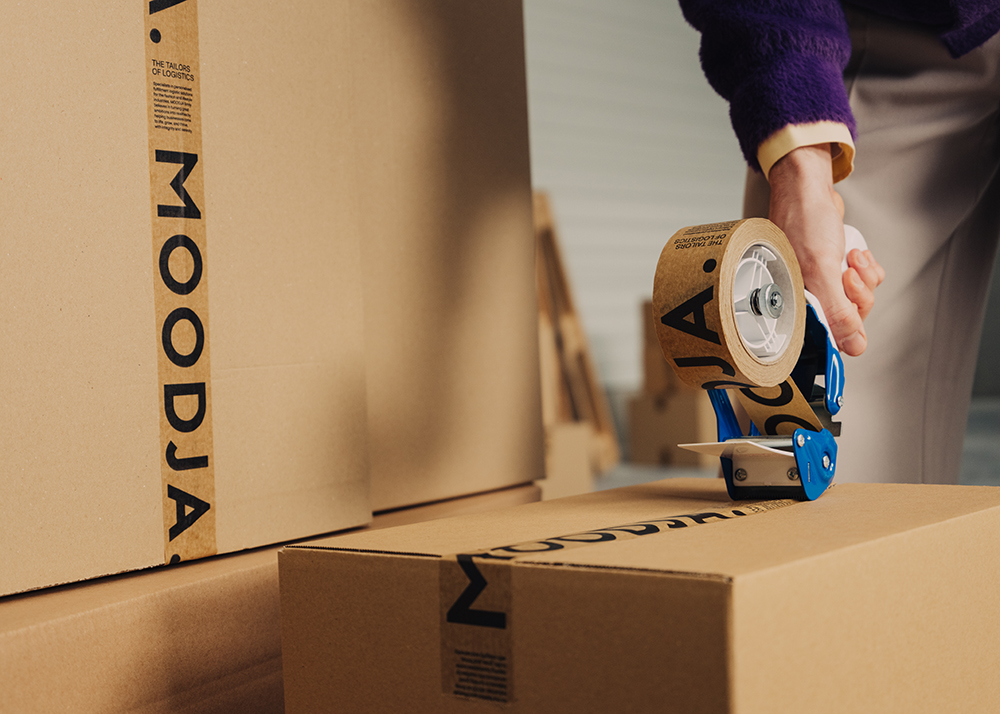What is 3PL?
3PL stands for ‘third-party logistics’ and describes the outsourcing of logistics processes to an external partner. This means that a company does not handle tasks such as storage, order picking, packaging, shipping and returns itself, but instead outsources them to a specialised service provider. The advantage lies in the reduction of strain on internal resources. Brands can focus more on product development, marketing and growth, while logistics runs reliably in the background.
3PL has long been an integral part of modern e-commerce. It is a flexible solution, especially for fast-growing companies, enabling them to remain competitive even during peak periods. Working with a 3PL partner creates transparency, reduces costs and increases efficiency. This makes 3PL more than just a service; it is a strategic building block for sustainable success.
What are 3PL providers?
3PL providers are specialised service providers that take on logistical tasks for companies. They provide storage space, take care of order picking, package goods in line with brand requirements and organise shipping. Many providers also offer returns management and individual services such as relabelling or quality checks.
Choosing the right 3PL provider is crucial for success in e-commerce. Large international players offer standardised solutions and enormous capacities. Boutique providers such as MOODJA, on the other hand, focus on tailor-made logistics for specific industries. Brands in the fashion, lifestyle and beauty sectors in particular benefit from specialised services that are tailored to their specific requirements. A good 3PL partner grows flexibly with you, offers interfaces to common shop systems and ensures a consistent customer experience. This makes 3PL providers more than just service providers – they are partners for long-term growth.
[[request]]
Advantages and disadvantages of 3PL
Advantages of 3PL
- Cost efficiency: You save on investments in your own storage space, personnel and IT systems.
- Scalability: Your business grows flexibly, whether there are seasonal peaks or sudden fluctuations in demand.
- Expertise: 3PL service providers contribute in-depth knowledge of logistics and fulfilment.
- International reach: A global network opens up new markets and faster delivery routes for you.
- Customer experience: Professional packaging and fast deliveries increase customer satisfaction.
- Easy integration: Uncomplicated interfaces to common shop systems such as Shopify, WooCommerce or Shopware ensure that orders, stock levels and tracking data are transferred seamlessly.
Disadvantages of 3PL
- Dependency: You are heavily reliant on the processes and quality of your 3PL service provider.
- Less control: Making your own adjustments or spontaneous changes is often more difficult to implement.
- Hidden costs: In addition to basic fees, additional services may incur extra costs.
- Communication effort: Smooth processes require close coordination and clear interfaces.

3PL vs. 4PL – what is the difference between 3PL and 4PL?
The key difference between 3PL and 4PL lies in the responsibility within the supply chain. A 3PL service provider takes on operational tasks such as storage, picking, packing, shipping and returns. The company outsources these processes but retains overall control of the supply chain itself.
A 4PL goes one step further. Here, the service provider not only handles the processing, but also the strategic management of the entire supply chain. This includes the selection and coordination of multiple logistics partners as well as the optimisation of processes. While 3PL primarily offers operational efficiency, 4PL provides holistic control and transparency across all levels. 3PL is particularly suitable for e-commerce brands when it comes to scalable and flexible solutions in day-to-day business, while 4PL is more appropriate for large, complex structures with a global reach.
3PL (Third Party Logistics)
- Definition:
External service provider that handles logistical tasks such as storage, order picking, packaging, shipping and returns. - Focus:
Operational processing - Typical services:
Warehousing, transport, returns management, packaging - Advantage:
Reduced workload for the company, greater efficiency and scalability - Suitable for:
E-commerce brands looking to outsource operational logistics
4PL (Fourth Party Logistics)
- Definition:
Takes over the entire control of the supply chain, including management of various 3PLs and strategic optimisation. - Focus:
Strategic management and coordination - Typical services:
Selection and management of multiple logistics partners, process design, supply chain optimisation - Advantage:
Holistic control, greater transparency and optimisation of complex supply chains - Suitable for:
Larger companies with global and complex supply chains
The importance of 3PL for e-commerce brands
For brands in e-commerce, 3PL logistics is much more than just an operational service. It is the foundation for growth, customer satisfaction and competitiveness. A 3PL service provider not only handles storage, packaging and shipping, but also ensures that orders reach customers reliably, quickly and in a manner consistent with the brand.
The importance of 3PL is particularly evident during peak periods such as Christmas or Black Friday. Flexible capacities enable brands to handle large order volumes with ease, without having to set up their own storage space or hire additional staff. At the same time, personalised packaging and well-designed returns management enhance the shopping experience and promote customer loyalty.
This makes 3PL a decisive factor for success in e-commerce. Outsourcing logistics to a specialised partner frees up resources for product development, marketing and sustainable growth.
Examples of 3PL service providers
The world of 3PL service providers is diverse. Major international providers include companies such as DHL Supply Chain and DB Schenker, which offer standardised solutions with global reach. They score points with their enormous capacities and broad networks, but are often more suitable for corporations with complex structures.
In addition, there are specialised boutique 3PLs that focus on specific industries. MOODJA, for example, offers tailor-made fulfilment solutions for fashion, lifestyle and beauty. The focus here is on individual services, such as personalised packaging, sustainable processes and seamless integration into common shop systems.
Whether large or specialised, it is crucial to choose the 3PL service provider that best understands your requirements. Especially for e-commerce brands with clear positioning, it pays to have a partner who not only handles processes but also strengthens the brand experience.

MOODJA as your fashion 3PL service provider
MOODJA is more than a traditional 3PL provider. We specialise in fulfilment solutions for fashion, lifestyle and beauty and understand the specific requirements of these industries. Our boutique warehouse in Berlin offers state-of-the-art storage technology, sustainable processes and a team that is always ready to listen to your brand.
As a fashion 3PL service provider, we value tailor-made solutions. These include personalised packaging for a unique unboxing experience, flexible interfaces to shop systems such as Shopify, WooCommerce or Shopware, and efficient returns management. We grow with you, whether you are just starting out or already an established brand.
With MOODJA, you get a partner who not only handles logistics, but also actively contributes to strengthening your brand. This allows you to focus on your core business while we make your logistics smart, reliable and sustainable.
[[request]]
Conclusion
3PL has long been a central component of modern logistics. For e-commerce brands, it means greater efficiency, flexibility and an improved customer experience. While large providers offer standardised solutions, specialised 3PL service providers such as MOODJA score points with tailor-made services for fashion, lifestyle and beauty.
Whether it's shipping your products, scaling up during peak periods or sustainable returns processes, having an experienced partner at your side saves you time, money and resources. This frees up space for what really matters: your brand, your products and your growth.
If you are looking for a 3PL service provider that rethinks logistics and understands your brand, MOODJA is the right choice for you.
Start now with MOODJA as your boutique 3PL partner and grow without logistics stress.
FAQs about 3PL
What is 3PL?
3PL stands for ‘third-party logistics’ and describes the outsourcing of logistics tasks such as storage, order picking, packaging, shipping and returns to a specialised service provider.
What does 3PL mean in logistics?
In logistics, 3PL refers to collaboration with an external partner who takes over operational processes, thereby making companies more flexible, efficient and scalable.
What are 3PL providers?
3PL providers are service providers that take on central logistics tasks for companies. They range from large international players to specialised boutique partners such as Moodja.
What is the difference between 3PL and 4PL?
3PL service providers take care of operational logistics, while 4PL strategically manages the entire supply chain and often coordinates multiple 3PLs.
[[request]]






